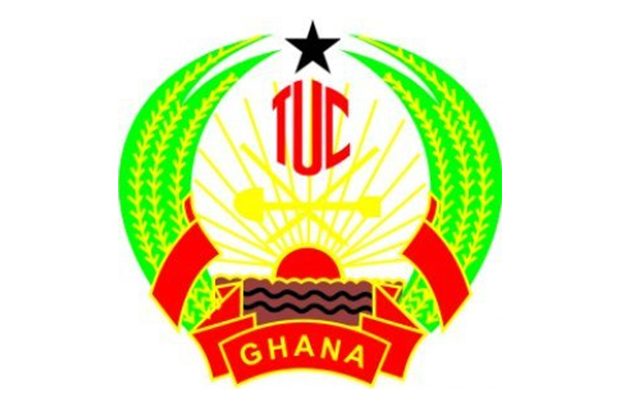THE TRADES Union Congress (TUC) Ghana says it is time for all stakeholders to work with government to reverse the current declining economic trend with its grim outlook.
Organised Labour, which disclosed this in its comments on the 2023 Budget Statement presented recently to Parliament by Finance Minister Ken Ofori-Atta, said though government has blamed the dire macroeconomic situation mainly on the COVID-19 pandemic and the war in Ukraine, “We hold the view that other internal factors may have contributed significantly to the economic and cost of living crisis leading to a severe decline in the standard of living of the people of Ghana. These factors relate to extremely hostile partisan politics, failures in economic management, unfavourable trade, investment, and tax policies, failures in monetary and fiscal policy management, poor performance in revenue collection, excessive expenditure on non-priority projects (including high expenditures on a cathedral), abuse of procurement processes, among other factors.”
It has, therefore, called on government to initiate an independent investigation into the root causes of the economic crisis in order to avoid such crises in future.
“It was clear from the Budget Statement that Ghana’s macroeconomic situation is very precarious. Economic growth has slowed considerably from the trend growth before the pandemic; government revenues have fallen along with high expenditures leading to high budget deficits; national debt has reached unsustainable levels; inflation is at 22-year high and still rising; interest rates (cost of borrowing) are high and rising; the cedi has suffered massive depreciation never seen in recent times; high balance of payment deficit; declining international reserves; high fuel prices; and declining real incomes. The resulting costs of living increases has imposed excessive burden on workers and Ghanaians in general and pushed many Ghanaians into severe poverty. The economic outlook is gloomy,” it stated.
Revenue Mobilisation
Commenting on the various measures announced by government to increase tax revenues in 2023, the TUC said such taxes (especially the additional 2.5% VAT) would hurt poor people and workers on fixed and low incomes because, businesses would pass on their share of the additional tax burden to consumers.
“We vehemently oppose these tax measures because they will increase the tax burden on workers and poor Ghanaians further while preserving the privileges for the rich. Rather than increasing tax rates, government must fix the leakages and improve the efficiency of the tax system.
“However, we welcome the moratorium on the granting of new tax exemptions. We encourage government to implement the Exemptions Act and end all harmful exemptions that deprive the state billions of Ghana Cedis.
“The decision to fast-track the implementation of Unified Property Rate Platform programme in 2023 is also welcome.
“As part of the implementation of 2023 Budget, we expect government to overhaul the fiscal regime in the natural resource sector to ensure that Ghana earns more revenues from its natural resources. It is unacceptable that Ghana makes less than 10 per cent in taxes and royalties from gold export while imposing a 35 per cent tax on personal incomes including wages and salaries. The mineral wealth of this country belongs to the people of Ghana, and so we must earn more from it,” it noted.
The TUC continued that the decision to review key government programmes to reflect relevance, promote efficiency, and ensure value for money was a step in the right direction.
“We also welcome the decision to review the operations of State-Owned Enterprises (SOEs). But more clarity is needed on these decisions in the context of the current crisis and the long-term aspirations of the country.
“As government prepares to implement the 2023 Budget Statement and Economic Policy, immediate measures are needed to assure the people of Ghana that government is doing its part to reduce expenditures. First, government must boldly deal with the serial infractions reported by the Auditor-General. Second, we demand immediate and radical downsizing of government before the end of the year. This must include a substantial reduction in the number of ministries and ministerial portfolios.
“We believe that a significant reduction in the size of government can galvanise support for government’s measures announced in the 2023 Budget Statement and Economic Policy. Failure to act decisively will contribute to strengthen resistance to governmental initiatives,” it asserted.
Employment
It indicated that thousands of workers are still losing their jobs, as businesses suffer from the uncertainties caused by the macroeconomic instability. “In this precarious economic situation, having a job and a regular source of income make a lot of difference. This is the reason why government must protect and not destroy opportunities for job creation, particularly in the public sector.”
Hiring Freeze
It said government’s decision to implement a hiring freeze in the public sector was wrong. “We had thought that protecting employment would have been at the heart of the recovery process. Employment freeze in the public sector at this time has several implications. It will be adding to the pain of Ghanaians, especially young graduates struggling to secure employment. Already too many workers are losing their jobs in the private sector. To close the public sector to new entrants is a stab in the back of young Ghanaians who have been educated at great costs to their families and the nation. What is the point of free SHS if graduates cannot secure jobs? Moreover, employment freeze will negatively affect public service delivery. As thousands of workers retire every year and government fails to replace them, existing workers will be overburdened. This will negatively affect their performance.”
It advised, “We urge government to reverse the decision to freeze employment in the public sector. This is not the time to destroy jobs. This is the time to protect jobs.”
BY Ebenezer Amponsah

